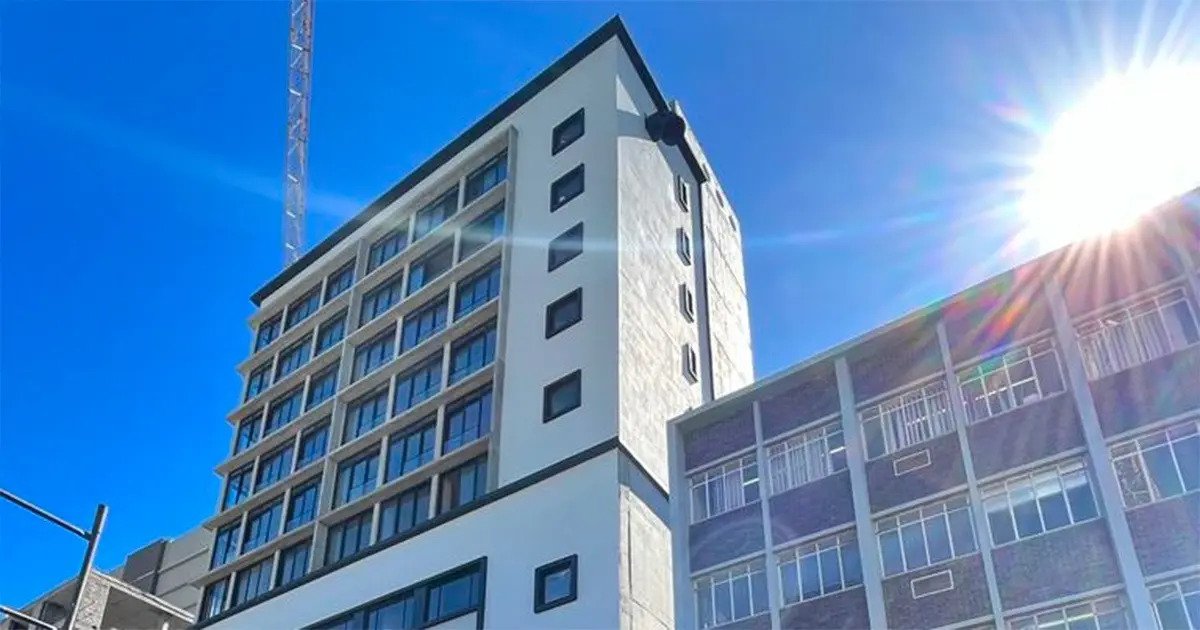In May 2023 it was reported that Hemp Hotel, the world’s highest building on cannabis, would be completed by June of the same year.
However, the project’s contractor and partner, Afrimat Hemp, recently revealed that the building is not yet finished. Nonetheless, the company ascertained that the world’s tallest building built from cannabis is nearing completion and it is still expected to open its doors to the public on Nov 2023.
It would have taken the project around four years to complete if it kept to this timeline. Its construction began back in 2019.
Hemp Hotel at 84 Harrington Street in Cape Town Project Timeline
Jul 2022
World’s tallest hemp building, Hemp Hotel at 84 Harrington Street in Cape Town
The Hemp Hotel at 84 Harrington Street in Cape Town, South Africa, has been named the world’s tallest building built using hempcrete blocks and hemp construction materials. Developed by Hemporium and Afrimat Hemp, the project establishes the standard for constructing a secure, carbon-neutral multistory skyscraper.
Industrial hemp is a botanical category of Cannabis sativa cultivars developed primarily for commercial or therapeutic purposes. Hemp is one of the plants on earth that grows the quickest, along with bamboo.
The desire to reduce carbon dioxide emissions is driving a significant rise in the market for bio-based building materials. Hemp construction is regarded as the gold standard for CO2 reduction in buildings.
Previously, hempcrete was used to construct hemp homes in South Africa. However, this was not practical for a project of 84 Harrington’s magnitude. The 12-storey Hemp Hotel at 84 Harrington Street building featuring a total of 50 apartments was, therefore, built using hemp blocks created in Europe.
These blocks have reportedly been successfully used to commercialize hemp in the building sector. Hemporium reported identified the preferred partners in light of the above.
Also Read: PPAs Signed for Three Co-Located Solar & Storage Projects in South Africa
Hemp Hotel at 84 Harrington Street Project partnership
The partners are Wolf and Wolf, Architects, and Afrimat Hemp. This is according to Tony Budden the director and founding partner of Hemporium.
Wolf & Wolf Architects is a firm that specializes in modern and environmentally friendly architecture. Afrimat Hemp on the other hand is a company that concentrates on building carbon-neutral structures. It also focuses on maximizing the potential of the industrial hemp market.
The Hemporium and Afrimat Hemp collaboration think employing hemp in a multistory structure has several advantages. First, hemp is entirely natural, CO2-absorbing, energy-efficient, and long-lasting.
Secondly, provides superior acoustic performance, ensuring privacy between units. Furthermore, the material has the capacity to absorb and release moisture. This helps control the internal humidity of buildings and maintain healthy indoor air quality.
According to the collaboration, the reduced density of hemp also decreases the weight of the walls on the foundations and, as a result, the price of concrete.
May 2023
Hemp Hotel at 84 Harrington Street in Cape Town to open in June 2023
The construction of the Hemp Hotel at 84 Harrington Street in Cape Town, South Africa, is expected to be completed in June 2023. The project is reportedly putting the finishing touches to the 54-room Hemp Hotel which will have a breathtaking view of Table Mountain and a minimal ecological footprint.
The initial hemp blocks used for building the Hemp Hotel were imported from Britain since South Africa had banned local production. However, the government started issuing cultivation permits last year. President Cyril Ramaphosa especially has supported the cannabis and hemp sector making it an economic priority that could create over 130000 jobs.
The Future of Hemp Blocks in South Africa
Afrimat Hemp is currently preparing to produce the first blocks made of pure South African hemp. This will be a game changer since many social housing projects are targeting to use of hemp.
However, there will be cost issues since hemp is 20 per cent more expensive compared to other conventional materials. Hempcrete blocks are also likely to be made more financially palatable since they absorb carbon emissions just as planting trees. Furthermore, funding forest plantations is relatively expensive to build hemp houses according to Afrimat carbon consultant, Mr. Wihan Bekker.
